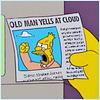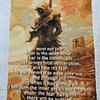Take a photo of a barcode or cover
Dark and gloomy castles, characters slowly going insane, and ghosts that loom the halls, that's my kind of book!
A very strange book. I think I need to read the rest. Very odd and artful use of language.
dark
mysterious
reflective
slow-paced
This book is full of super-rich, intricately worded prose, the action unfolding at a glacial pace as Peake lays out every minute detail of the setting and the reactions of the characters. Admittedly, this is not usually my thing, so this book was a struggle at times, but I did get a lot out of it. I won't have the energy to finish the trilogy in the near future, but I am compelled enough to find out what happens that I'm not sure I'll be able to avoid it.
More and more often I don't finish books because I just don't have the time for bad or boring books, and besides I find it's actually depressing to get bogged down in them. Unfortunately this was one of them. I didn't get past page 150 or so, definitely feeling it wouldn't get much better or even different. I so would have liked to like this better. I recently saw a small exhibition about his life and work at the British Library, and this is what made me finally start this novel. The drawings on display there were delightful, the light verse quoted was entertaining and his concept version for an animated film for the BBC was charming. But this 'novel' just doesn't cut it.
In a way, his creativity reminds me of Terry Gilliam's. His also seems to be an imagination run wild, and multidisciplinary to boot. (Look at the delightful cartoonish drawings of Don Quixote he dashes off in the enthralling documentary about his failed film project, Lost in La Manch, reminding you that he was an animation artist for Monty Python before he became a 'real' film director.) But I assume his imagination, although always threatening to fly off the rails, is held in check by the fact that films are a commercial undertaking, and he has to satisfy investors. This is all for the good, he's turned out some glorious (even if sometimes gloriously flawed) films that I wouldn't have wanted to miss for all the world.
Peake's imagination in this novel doesn't seem to be held in check by anyone or anything, least of all the average reader's need for narrative tension and pace. There is none of that that I can find. On the internet I see fans defending his expansiveness by praising his lavish prose. But I didn't find his prose all that wonderful, and I *did* find his expansiveness tedious. And it wouldn't be so bad, if only it were embedded in a strong narrative structure. Lacking that, it lacks tension. The narrative seems adrift. It's like a child on an endless Sunday afternoon who keeps dreaming about this dream castle containing myriads of characters – Peake bouncing them off against each other like a preteen playing with his Lego figures.
Even the unrelenting 'darkness' of both the castle and its inhabitants gets to be repetitive. It's as though he's all the time warning himself not to make any character too attractive or it will smack of Hollywood cliché.
It's such a pity, but I'm afraid this is the novel of a potentially major artist who just happened to choose the wrong medium for his art.
The fans are welcome to keep enjoying this, but I can't help being puzzled (and a little bit worried too) at the high reputation this work still seems to garner.
In a way, his creativity reminds me of Terry Gilliam's. His also seems to be an imagination run wild, and multidisciplinary to boot. (Look at the delightful cartoonish drawings of Don Quixote he dashes off in the enthralling documentary about his failed film project, Lost in La Manch, reminding you that he was an animation artist for Monty Python before he became a 'real' film director.) But I assume his imagination, although always threatening to fly off the rails, is held in check by the fact that films are a commercial undertaking, and he has to satisfy investors. This is all for the good, he's turned out some glorious (even if sometimes gloriously flawed) films that I wouldn't have wanted to miss for all the world.
Peake's imagination in this novel doesn't seem to be held in check by anyone or anything, least of all the average reader's need for narrative tension and pace. There is none of that that I can find. On the internet I see fans defending his expansiveness by praising his lavish prose. But I didn't find his prose all that wonderful, and I *did* find his expansiveness tedious. And it wouldn't be so bad, if only it were embedded in a strong narrative structure. Lacking that, it lacks tension. The narrative seems adrift. It's like a child on an endless Sunday afternoon who keeps dreaming about this dream castle containing myriads of characters – Peake bouncing them off against each other like a preteen playing with his Lego figures.
Even the unrelenting 'darkness' of both the castle and its inhabitants gets to be repetitive. It's as though he's all the time warning himself not to make any character too attractive or it will smack of Hollywood cliché.
It's such a pity, but I'm afraid this is the novel of a potentially major artist who just happened to choose the wrong medium for his art.
The fans are welcome to keep enjoying this, but I can't help being puzzled (and a little bit worried too) at the high reputation this work still seems to garner.
Very flowery language, has a definite verbose style.
Strange, Dickensian,
Alone folk in a bizarre
Castle: Gormenghast.
Alone folk in a bizarre
Castle: Gormenghast.
It's really good, but holy cow is it ever long. Peake can take 4 pages to tell you "nothing happened". I'm not sure if I'm ready to read the rest of the trilogy yet, perhaps I will pound back some shorter works to freshen my attention span first.
Intriguing story of a castle overwhelmed by tradition and what that does to the inhabitants and, to a lesser degree, the villagers around it. The many characters are all fully drawn and fascinating. The real treat here, however, is the language. The richness of the many metaphors demand that the reader take time to unpack them and delight in them.







